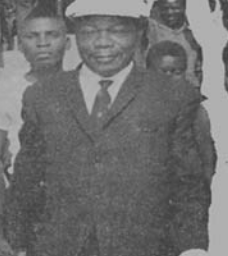
Northern Rhodesia was a British protectorate in south central Africa, now the independent country of Zambia. It was formed in 1911 by amalgamating the two earlier protectorates of Barotziland-North-Western Rhodesia and North-Eastern Rhodesia. It was initially administered, as were the two earlier protectorates, by the British South Africa Company (BSAC), a chartered company, on behalf of the British Government. From 1924, it was administered by the British Government as a protectorate, under similar conditions to other British-administered protectorates, and the special provisions required when it was administered by BSAC were terminated.

Sir Roland "Roy" Welensky, was a Northern Rhodesian politician and the second and last Prime Minister of the Federation of Rhodesia and Nyasaland.

The United Federal Party (UFP) was a political party in the Federation of Rhodesia and Nyasaland.

Sir Edgar Cuthbert Fremantle Whitehead, was a Rhodesian politician. He was a longstanding member of the Southern Rhodesian Legislative Assembly, although his career was interrupted by other posts and by illness. In particular he had poor eyesight, and wore very thick glasses, and later experienced deafness whilst in office. An ally of Sir Roy Welensky, he was Prime Minister of Southern Rhodesia from 1958 to 1962. His government was defeated in the 1962 general election by the Rhodesian Front.

The Zambian African National Congress was a political party in Zambia.

General elections were held in Rhodesia on 30 July 1974. They saw the Rhodesian Front of Ian Smith re-elected, once more winning every one of the 50 seats elected by white voters.

General elections were held in Southern Rhodesia on 14 December 1962. Voters elected 65 members of the Legislative Assembly. The election was notable for bringing to power the Rhodesian Front, initially under Winston Field, which set the colony on the course for its eventual Unilateral Declaration of Independence.
Ahrn Palley was an independent politician in Rhodesia who criticised the Smith administration and the Unilateral Declaration of Independence. Ian Smith described him as "one of the most able politicians this country has produced, and although our political philosophies did not coincide, we always respected one another and maintained friendly relations."

Harry Mwaanga Nkumbula was a Zambian nationalist leader involved in the movement for the independence of Northern Rhodesia, as Zambia was known until the end of British rule in 1964. He was born in the village of Maala in the Namwala district of Zambia's southern province. He was the youngest of three children and the only son.

The Rhodesia Labour Party was a political party which existed in Southern Rhodesia from 1923 until the 1950s. Originally formed on the model of the British Labour Party from trade unions and being especially dominated by railway workers, it formed the main opposition party from 1934 to 1946. The party suffered a catastrophic split during the Second World War and lost all its seats, and a further split over the attitude to the Federation of Rhodesia and Nyasaland ended its involvement in Rhodesian politics.
General elections were held in Southern Rhodesia on 15 September 1948. They saw Prime Minister Godfrey Huggins regain the overall majority he had lost in the previous elections in 1946. Huggins' United Party won a landslide, reducing the opposition Liberal Party to a small minority.
The Rt Hon. Sir Robert Clarkson Tredgold, KCMG, PC, was a Rhodesian barrister, judge and politician.
The colonial history of Southern Rhodesia is considered to be a time period from the British government's establishment of the government of Southern Rhodesia on 1 October 1923, to Prime Minister Ian Smith's unilateral declaration of independence in 1965. The territory of 'Southern Rhodesia' was originally referred to as 'South Zambezia' but the name 'Rhodesia' came into use in 1895. The designation 'Southern' was adopted in 1901 and dropped from normal usage in 1964 on the break-up of the Federation of Rhodesia and Nyasaland, and Rhodesia became the name of the country until the creation of Zimbabwe Rhodesia in 1979. Legally, from the British perspective, the name Southern Rhodesia continued to be used until 18 April 1980, when the name Republic of Zimbabwe was formally proclaimed.

The Federation of Rhodesia and Nyasaland, also known as the Central African Federation or CAF, was a colonial federation that consisted of three southern African territories: the self-governing British colony of Southern Rhodesia and the British protectorates of Northern Rhodesia and Nyasaland. It existed between 1953 and 1963.

General elections were held in Northern Rhodesia on 30 October 1962, with by-elections for several seats held on 10 December. Although the United Federal Party won the most seats in the Legislative Council, and Northern Rhodesian African National Congress leader Harry Nkumbula had made a secret electoral pact with the UFP, Nkumbula decided to form a government with the United National Independence Party.

General elections were held in Northern Rhodesia on 20 March 1959, although voting did not take place in two constituencies until 9 April. The United Federal Party (UFP) was expected to win the elections, and did so by taking 13 of the 22 elected seats on the Legislative Council.

The Monckton Commission, officially the Advisory Commission for the Review of the Constitution of the Federation of Rhodesia and Nyasaland, was set up by the British government under the chairmanship of Walter Monckton, 1st Viscount Monckton of Brenchley, in 1960. Its purpose was to investigate and make proposals for the future of the Federation of Rhodesia and Nyasaland, made up of Southern Rhodesia, Northern Rhodesia and Nyasaland—respectively equivalent to today's Zimbabwe, Zambia and Malawi.
The Dominion Party was a political party in the Federation of Rhodesia and Nyasaland, led by Winston Field.
The Capricorn Africa Society was a multiracial pressure group in British colonies in southern and eastern Africa in the 1950s and 1960s.
Maureen Thelma Watson was a Rhodesian politician.








